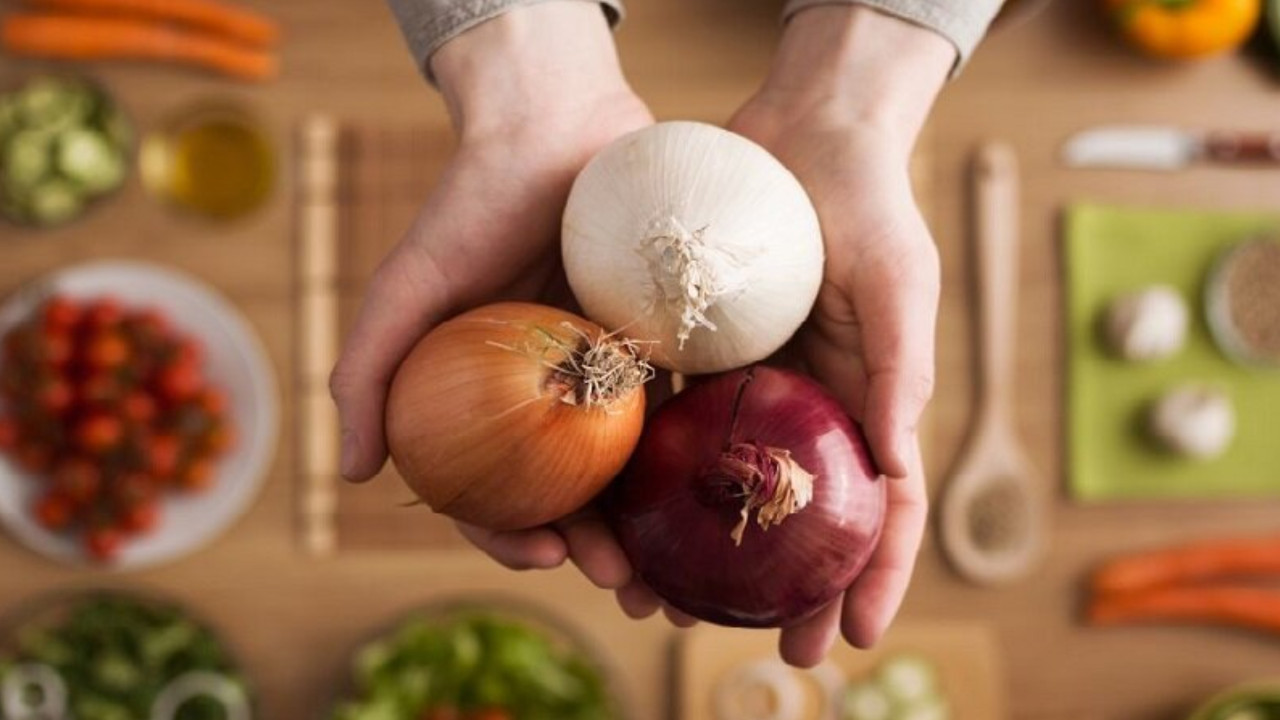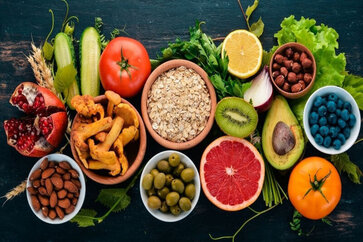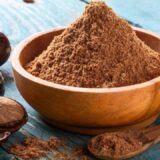Onion Benefits in Ayurveda: Top 10 Health Uses and Remedies
Every substance in nature, including foods and herbs, possesses unique qualities that impact the doshas. Among these, the humble onion (Allium cepa) stands out as both a common kitchen ingredient and a powerful medicinal tool.
Onions have held a place of reverence in Ayurveda for centuries, with ancient texts like the Charaka Samhita and Sushruta Samhita highlighting their use in addressing respiratory issues and digestive problems and supporting reproductive health.
Beyond India, onions were valued in Egyptian, Greek, and Roman civilizations for their healing properties. Today, modern science affirms many of these benefits, while Ayurveda provides a distinct perspective, connecting the onion’s effects to its energetic qualities and its ability to balance the doshas.
In Ayurveda, onions are considered a potent herb that can warm the body, stimulate digestion, and cleanse the system of toxins. Their pungent, sharp nature makes them particularly effective in balancing excess Kapha and Vata doshas. By harmonizing the body’s internal energies, onions promote overall health and vitality, showcasing their timeless therapeutic value.
Vernacular names
Different regional names for onions across India:
- Hindi: Piyaz, Pyaz
- Kannada: Nirulli, Irulli
- Bengali: Pyanj
- Malayalam: Chuvannaulli
- Telugu: Nirulli
- Tamil: Vengayam
- Punjabi: Ganda
- Marathi: Konda
- Gujarati: Dungali, Dungari, Kando
- Assamese: Kachu, Piyaz
- Oriya: Kanda
- Rajasthani: Pyaj
- Haryanvi: Piyaz
- Urdu: Piyaz, Pyaz
- Konkani: Piyav, Dungari
- Sindhi: Kanda
- Maithili: Piyaz
Sanskrit synonyms for onion:
- Yavanesta – Liked by European people, referring to the onion’s popularity and appreciation in European cultures.
- Durgandha, Mukha Dooshaka – Causes bad breath, highlighting the pungent odor onions can leave, especially after consumption.
- Sukandaka – The bulb is beautiful, describing the appealing shape and nature of the onion bulb, admired for its unique form and aesthetic.
- Palandu – A traditional Sanskrit term for onion, often mentioned in ancient texts. It is associated with the onion’s strong, invigorating aroma and its use in both culinary and medicinal applications.
Onion Ayurvedic Properties
Rasa (Taste):
- Madhura (Sweet)
- Katu (Pungent)
Guna (Qualities):
- Guru (Heaviness)
- Snigdha (Unctuous, Oily)
- Teekshna (Strong, Piercing)
Vipaka (Post-Digestive Effect):
- Madhura (Sweet) – Converts to a sweet taste after digestion.
Virya (Potency):
- Anushna (Mildly Warm) – Not very hot in potency.
Effect on Tridosha:
- Balances Vata due to its oiliness, sweetness, and mild heat.
- Has a neutral effect on Pitta.
- Slightly increases Kapha Dosha due to its unctuous and heavy qualities.
Ayurvedic Use and Home Remedies of Onion
- The paste of onion is applied over localized swelling and wounds, then covered with a bandage as treatment.
- Fresh onion juice or oil processed with onion juice is poured into the ears to treat earaches.
- The juice of Allium cepa is taken in a dose of 10-15 ml daily to improve vision.
- Onion slices fried in ghee and taken internally help treat cough with phlegm, asthma, and hoarseness of the voice due to cold.
- The paste of onion is applied over blackheads and moles to treat them.
- The paste of onion, slightly heated, is applied over areas affected by sciatica, joint pain, and nerve pain.
- Onion juice is instilled into the nostrils in cases of nasal bleeding.
- The onion is cut into small pieces and boiled with double the quantity of milk. This milk is consumed to treat bleeding piles and other bleeding disorders.
- The sweet variety of onions, cut into slices, fried in ghee, and consumed regularly, helps increase vitality and sexual vigor.
- Onion juice, consumed in doses of 10-15 ml with a pinch of rock salt, improves appetite and digestion.
- Onion seeds, powdered and consumed in doses of 3-5 g with pomegranate juice, are used to improve sperm count.
- The fresh juice of onion is consumed in doses of 15-20 ml to treat fever arising from indigestion.
- The paste of onion is kept over areas affected by dental caries and inflammation of the gums.
- Fresh and cooked onions are used as a vegetable in many recipes worldwide, offering both flavor and medicinal benefits.
Onion (Allium Cepa) Medicinal Uses
- It aggravates Kapha and alleviates Vata, but does not alleviate Pitta. It is primarily useful as a food, balancing the body’s internal energies when consumed in moderation.
- It is heavy and aphrodisiac, promoting strength and appetite, making it beneficial for those with weak digestion or low vitality.
- Red onion’s qualities are quite similar to garlic, offering similar medicinal benefits, particularly in improving circulation and respiratory health.
1. Onion Medicinal Benefits
- Balakara – Improves strength and immunity, enhancing overall resilience against illness.
- Veeryakara – Enhances the quality and quantity of sperm and semen, supporting reproductive health and vitality.
- Agnivardhana – Improves digestion strength, helping to boost metabolism and nutrient absorption.
- Sthira Dhatukara Strengthens the body and improves stability, contributing to better physical endurance and balance.
- Medhada – Enhances intelligence, supporting cognitive function and mental clarity.
- Psuhtida – Nourishing, promoting overall health by revitalizing tissues and organs.
It is widely used in treating neurological pains, sciatica, and osteoarthritis due to its anti-inflammatory, analgesic, and circulation-boosting properties.
2. Onion Seed Benefits:
- Vrushya – Aphrodisiac; improves vigor and enhances sexual health by boosting energy and stamina.
- Dantakeetajit – Useful in treating dental caries, helping to fight tooth decay and gum infections.
- Pramehajit – Beneficial in urinary tract disorders and diabetes, helping regulate blood sugar levels and supporting urinary health.
3. Onion Juice Benefits:
- Snigdhangatva – Makes the body lustrous, promoting a healthy and radiant appearance.
- Gaurata – Imparts heaviness, providing a feeling of fullness and strength.
- Kantimata – Improves skin complexion, giving the skin a smoother and healthier look.
- Vahnerdeepti – Improves digestion strength, enhancing the body’s ability to digest food efficiently.
- Charma Shuddhi – Detoxifies the skin, helping to clear impurities and promote a clearer complexion.
- Vrushatva – Acts as an aphrodisiac, boosting sexual health and vitality.
- Deerghamayu – Anti-aging, promoting longevity, and reducing the visible signs of aging.
- Balakara – Improves strength and immunity, boosting overall resilience against illnesses.
- Varnakara Improves skin tone and complexion, providing a natural glow to the skin.
- Ojaskara – Enhances immunity, strengthening the body’s defense system.
- Swarakara – Improves voice tone and quality, making the voice clearer and stronger.
- Saumanyasya – Brings calmness to the mind, reducing stress and promoting mental peace.
- Badhira – Useful in hearing problems, supporting ear health, and improving auditory function.
Top Health Benefits of Onions in Ayurveda
Ayurveda prescribes onions for a wide range of health concerns. Let’s explore their therapeutic applications:
1. Digestive Health
Onions are renowned for kindling Agni (digestive fire). Their pungent taste and heating energy stimulate enzyme secretion, enhancing nutrient absorption and metabolism.
- Reduces Ama (Toxins): Onions break down undigested food particles (ama), a root cause of disease in Ayurveda. A classic remedy for bloating involves consuming roasted onions with rock salt.
- Relieves Constipation: The fiber in cooked onions promotes bowel regularity, while their heating quality mobilizes stagnant Vata in the colon.
2. Respiratory Health
Onions excel at clearing Kapha-related respiratory congestion. Their expectorant properties help expel phlegm, making them a staple in Ayurvedic cough and cold remedies.
- Bronchitis and Coughs: A traditional recipe combines onion juice with honey and ginger to soothe throat irritation and reduce mucus.
- Sinus Relief: Inhaling the vapors of boiled onion water can open nasal passages and relieve sinus pressure.
2. Immune Support
Onions possess natural antimicrobial and anti-inflammatory compounds, such as quercetin and allicin. Ayurveda links this to their ability to boost Ojas, the essence of immunity and vitality.
- Fighting Infections: Raw onion juice mixed with turmeric is used in rural India to treat fevers and bacterial infections.
- Seasonal Wellness: Consuming onion soup during monsoon or winter helps guard against colds and flu.
4. Reproductive Health
Ayurveda considers onions a Vajikarana (aphrodisiac) food. They nourish Shukra Dhatu (reproductive tissue) and enhance libido.
- Male Fertility: Onion juice with ashwagandha powder is a traditional tonic for improving sperm count and motility.
- Menstrual Health: Cooked onions in ghee balance Vata in the reproductive system, easing menstrual cramps.
5. Detoxification and Blood Purification
Onions are rich in sulfur, a mineral critical for liver detoxification. Ayurveda uses them to support Rakta Dhatu (blood tissue) and cleanse impurities.
- Liver Health: Onion-based chutneys or salads aid in flushing toxins and improving bile flow.
- Skin Disorders: Their blood-purifying effects help manage acne, eczema, and boils when consumed regularly.
6. Skin and Hair Health
Topical applications of onion are equally powerful in Ayurveda:
- Hair Growth: Onion juice applied to the scalp increases circulation, reduces dandruff, and combats alopecia. Studies link this to sulfur’s role in collagen production.
- Wound Healing: A paste of raw onion and honey disinfects cuts and accelerates tissue repair.
7. Joint and Musculoskeletal Health
Onions’ anti-inflammatory and heating properties make them valuable in managing joint disorders, particularly those linked to Vata and Ama (toxins).
- Arthritis Relief: Onions help reduce stiffness and pain in conditions like osteoarthritis (Sandhivata). A paste of onion, ginger, and sesame oil can be applied topically to inflamed joints to improve mobility.
- Muscle Recovery: Their sulfur content supports tissue repair, while their heating energy alleviates muscle spasms caused by Vata imbalance. Consuming onion soup post-exercise aids in recovery.
8. Heart Health
Ayurveda recognizes onions as a Hridya (cardiotonic) food, supporting the heart and circulatory system.
- Cholesterol Management: Onions help balance Meda Dhatu (fat tissue) by reducing LDL cholesterol and triglycerides, preventing plaque buildup in arteries (Srotorodha).
- Blood Pressure Regulation: Their potassium content and mild diuretic effect help maintain healthy blood pressure, especially for Kapha-dominant individuals prone to fluid retention.
9. Mental Health and Nervous System Support
Onions’ grounding properties pacify Vata’s erratic energy, which governs the nervous system.
- Stress and Anxiety: Consuming cooked onions with ghee calms the mind, stabilizes emotions, and improves focus by nourishing Majja Dhatu (bone marrow and nervous tissue).
- Insomnia Relief: A traditional remedy involves frying onions in ghee and consuming them with warm milk before bed to induce restful sleep.
10. Blood Sugar Balance
Onions are praised in Ayurveda for their role in managing Madhumeha (diabetes), particularly Kapha-type diabetes.
- Insulin Sensitivity: Their chromium content enhances insulin function, while the fiber slows glucose absorption.
- Pancreatic Support: Onion juice mixed with bitter herbs like fenugreek or neem helps rejuvenate the pancreas and regulate blood sugar levels.
Ayurvedic Medicines with Onion Ingredient
- Murivenna Oil – A renowned Ayurvedic oil used for treating non-healing wounds, fractures, and sprains. It helps to promote healing and reduce inflammation, speeding up recovery.
- Crackot Ointment – A proprietary Ayurvedic medicine effective in treating cracked heels. It helps remove dead skin cells from the affected area and softens the skin, providing relief from dryness and cracks.
- Pilocid Ointment – A proprietary Ayurvedic medicine used in the treatment of external bleeding piles. It has anti-inflammatory, styptic, and antibacterial properties, which help soothe irritation, reduce swelling, and promote healing of the affected area.
- Onion and Garlic Rasayana – A potent Ayurvedic formulation that combines onion and garlic to enhance overall immunity, digestion, and respiratory health. It is also known for its detoxifying properties and ability to balance the doshas, particularly Vata and Kapha.
- Panchakarma Oils (with Onion Extract) – Used in Ayurvedic detox treatments, these oils, enriched with onion extracts, are applied during Panchakarma therapies to enhance circulation, stimulate detoxification, and reduce inflammation in the body.
- Onion and Ginger Decoction – A traditional Ayurvedic remedy made by boiling onion and ginger to treat digestive issues, coughs, colds, and respiratory ailments. The combination helps to improve digestion, clear mucus from the respiratory tract, and boost immunity.
- Onion and Honey Syrup – Used as a natural remedy for soothing sore throats and coughs and improving digestion. The onion’s antibacterial properties, combined with honey’s soothing effect, create a powerful remedy for respiratory infections.
- Onion-based Hair Oil – A hair tonic made from onion extracts, known for its ability to stimulate hair growth, prevent hair loss, and improve scalp health. It is rich in sulfur, which nourishes the hair follicles and strengthens hair from root to tip.
Precautions and Contraindications
While onions are versatile, their heating and pungent qualities require mindful use:
- Pitta Imbalance: Excess raw onion may cause heartburn, acid reflux, or skin inflammation in Pitta-dominant individuals. Opt for cooked onions in moderation.
- Spiritual Practices: Onions are considered Tamasic in Ayurveda, meaning they may cloud mental clarity. Yogis and meditators often avoid them during spiritual retreats.
- Hyperacidity: Those with GERD or peptic ulcers should avoid onions, especially on an empty stomach.
- Allergies: Rare cases of onion intolerance (e.g., digestive upset) warrant discontinuation.
Onion Side Effects
- Digestive Issues – Consuming large quantities of raw onion can cause indigestion, bloating, and gas due to its high fiber content and sulfur compounds.
- Heartburn or Acid Reflux – Onions, especially when eaten raw, may trigger acid reflux or heartburn in some individuals, leading to discomfort or a burning sensation in the chest.
- Allergic Reactions – Some individuals may experience allergic reactions to onions, such as skin rashes, itching, or swelling. In rare cases, onion consumption can cause anaphylaxis.
- Irritation of the Eyes – The sulfur compounds released when cutting onions can irritate the eyes, causing tears and discomfort. This can lead to temporary redness and irritation.
- Blood Thinning – Onions have mild anticoagulant properties, meaning they may thin the blood. Those on blood-thinning medications, such as warfarin, should be cautious about consuming large amounts of onion.
- Breathing Difficulties – In rare cases, onions may cause difficulty in breathing, especially for individuals with respiratory conditions like asthma or those sensitive to certain food triggers.
- Bad Breath – The sulfur compounds in onions, especially raw onions, can contribute to bad breath (halitosis). Chewing gum or drinking water can help alleviate this.
- Interaction with Medications – Onions may interact with certain medications, particularly those for diabetes or blood pressure, affecting their effectiveness or causing unwanted side effects.
- Gastric Ulcers – Eating onions in excess, particularly raw, may irritate the lining of the stomach, aggravating gastric ulcers or leading to new stomach discomfort.
To avoid these side effects, it’s advisable to consume onions in moderation and consult with a healthcare provider if you have underlying conditions or are taking medications.
Part Used and Dosage:
Part Used:
- Bulb: The bulb is the most commonly used part, known for its medicinal and culinary properties.
- Seeds: The seeds are used for their therapeutic benefits, often in powder form for various treatments.
Dosage:
- Onion Juice: 10-20 ml, typically consumed to improve digestion and respiratory health.
- Onion Seed Powder: 1-3 g, used for its anti-inflammatory and antioxidant properties.
Onions embody Ayurveda’s core principle that “food is medicine.” With their ability to stimulate digestion, purify the blood, and enhance fertility, their benefits are both wide-ranging and specific. Yet, their powerful effects require careful consideration of one’s individual constitution (Prakriti) and any current imbalances (Vikriti).
Resources:
- Allium cepa: A Treasure of Bioactive Phytochemicals with Prospective Health Benefits(1)
- Potential of onion (Allium cepa) as traditional therapeutic and functional food: An update(2)
- Medicinal Properties of Onion and Garlic: A Review(3)
- Palandu (Onion) -A Commonly Used Adjuvant in Indian Delicacies(4)


























i regulary ,almost daily since many years eat one onion of medium size a day, raw.I cut the onion into thin slices ,soak it for few minutes in a refrigerated water and squeze a juice of a lemon on it.For me it is a delicacy and very difficult to do without it.Usually I eate it with my main meal .Also i i got the habit from many years ago to consume 3 gloves of garlic per day and somitimes more and this is how i prepare it.I crush the garlic and mix it with a yogurt and very finely shopped small cucumber to mild the flavor adding 1 to2 grams of salt.That is for me another delicacy.
I really dont remember got a flu or caught cold.